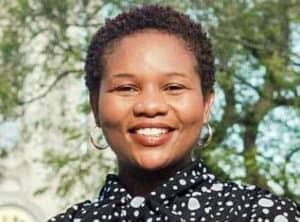It All Starts at Home

This month, Mike invited our newest employee, Essence Ellis — CHHSM and JLCM United Church of Christ Fellow — to author an article. This column originally appeared in the Justice and Local Church Ministries’ Witness for Justice.
By Essence Ellis
The national eviction ban ended on July 31. While tens of thousands of people attended a music festival, millions worried how close they are to being unhoused. As new mutations of the coronavirus spread across the country, only select states have made accommodations for those at risk of being evicted.
The issue of affordable housing isn’t a new crisis, but much like other aspects of American life, it has been brought into the light in the last 17 months. While I’m grateful that I have been housed throughout the entirety of this ongoing pandemic, it has not been easy to maintain the status of being housed. I’ve had the privilege of being able to reach out to family for financial help; many people have not. Countless folx across this country have picked up essential jobs to make ends meet, working tirelessly to ensure that they have a roof over their heads — just so they can eat, sleep, shower, and go back to work again.
Like other public health concerns, affordable housing is not the only concern to ensure that people have secure housing. To quote Lauryn Hill, “everything is everything”; it is all interconnected. What happens when teenagers on the South Side of Chicago are unable to get a comfortable, good night’s rest before having to take on the next day? Who suffers when housing authorities across the country neglect and villainize the tenants of government projects? When low-income families must pay rent that equates to more than 30 percent of their income to provide their children with homes in safer neighborhoods, how can anyone expect them to afford reliable healthcare?
These questions aren’t rhetorical, and the answers are uncomfortable. According to the Robert Wood Johnson Foundation, poor quality housing can impact both the physical and mental wellbeing of the people living in those inadequate conditions. I often wonder what my own life would have been like if I had grown up in a different neighborhood. My mother was a single parent who moved my brother and I to Charlottesville so we could have access to better public education; in retrospect, I see now that it was not an easy choice — it was a sacrifice.
When conversations of being unhoused are had in Christian communities, I tend to reflect on how our own friend, Jesus, was voluntarily unhoused; being a nomad was a critical aspect to his call (Matthew 8:20). Jesus found shelter in the home of whoever would welcome him. In the year 2021, being systemically and forcibly unhoused is no one’s calling. In a time when mental health is declining (and even if our collective mental health was not declining), everyone should have access to a home, a place where they can safely and comfortably decompress.
We must ask ourselves the common question: how do we enact change? How do we help provide shelter for our neighbor in a time when it is a health risk to open our homes to the stranger? I like to start by seeing who’s already doing work and/or organizing around housing in my community, searching social media or looking up organizations on the CHHSM website, or googling local churches that center this work. Whatever it might be, we all must do something.
Join Our Mailing LIst
"*" indicates required fields
Follow on Facebook
Pension Boards appoints David A. Klassen as its President, CEO - United Church of Christ
www.ucc.org
The Pension Boards, an affiliated ministry of the United Church of Christ recently announced its appointment of David A. Klassen as its next President and